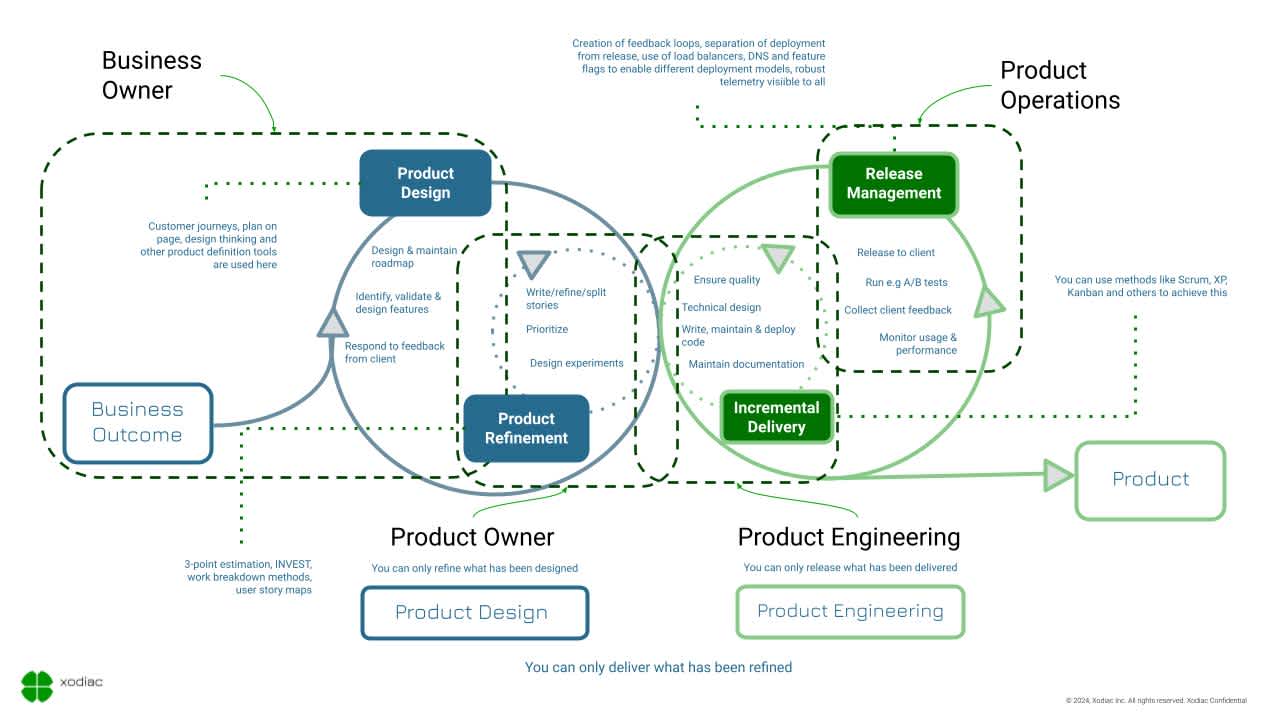Our musings
Check out our latest post

Enhancing Product Delivery Through Iterative Processes

Reading time: 5 min
Enhancing product delivery through iterative processes
The activities, tools and stakeholders involved in developing products comprise the Product Development Lifecycle (PDLC). Our customers have found the Xodiac PDLC a useful tool to explain how they deliver products and where they currently have gaps, whether in activities, tools, responsibilities or skills.
The Core Activities of PDLC
Let’s explain the key activities of the Xodiac PDLC, why each activity is necessary and how they all work together to create a dynamic learning environment.
Effective product development hinges on a well-organized sequence of activities that collectively form the PDLC. These activities are not stages; they are a strategic approach to crafting products that meet user expectations, from which businesses benefit. Their iterative nature enables continuous refinement and improvement of the final product.
The core processes are:
Product Design
It all starts with product design, in which the product's vision is con...
All articles

Knowing where you are on your digital transformation journey
Reading time: 7 min
How many of you have been through something labelled as a digital transformation in the past 5 years? Many hands go up, and several people groan. It seems like we are in a constant state of transformation, which is true. Change is the new normal and transformation is the grandiose title given to the work we build around it.
Yet many transformation efforts stall or even fail. We encounter many reasons for this, including market pressure, hierarchy and blame culture. Even gut instinct being the primary way to make decisions comes into play! Core to most digital transformation efforts is aligning technology to business goals, which often creates problems with delivering the desired change due to their different goals.
When technology departments drive the transformation, they often need help explaining the value. Ensuring stability to reduce rework through innovative techniques and tools may not resonate. Still, we do require change through transformation for our businesses to thrive. With...

Securing the value chain
Reading time: 5 min
Whether we are working from home or our offices, the challenge of ensuring the secure delivery of business value to our customers is a difficult one.
On the one hand, we need to enable our teams to deliver value quickly as this increases our ability to learn from our customers. On the other hand, we want to stop the unwanted exposure of customer data by ensuring secure delivery. These two goals may seem at odds. After all, a high-rate of change increases the chance something goes wrong. This results in a natural tendency to want to slow down the delivery process. However, there are ways to ensure you get both speed and safety.
Let us look at some of the common failure patterns and how to approach creating a strategy to remediate.

This is the time. Every crisis is an opportunity
Reading time: 3 min
We rarely find the time to invest in personal development when we are heads down in our work and lives. Often it only occurs when a situation where something outside of our control frees up time. Even then, it takes an effort to invest in our personal development. However, it is you. You who always wanted to improve but never found time or resources to do it. It is you who has this opportunity to invest in your future today!
With the economy having slowed to a point where many organizations either have to fire staff or find them not fully occupied, this is the perfect moment to invest in that improvement there never was time for previously. Perhaps this is the time for your teams to be engaged in a program x-raying your delivery process, identifying initiatives that will set you apart from the competition, and enabling you to come out of this crisis ahead.

Face-to-face with the agile manifesto... Working with remote team members
Reading time: 5 min
As health specialists and governments encourage employees to work from home en masse, many employers start fearing the impact on their teams’ productivity. After all, the agile manifesto states as one of its principles:
“The most efficient and effective method of conveying information to and within a development team is face-to-face conversation.
”
Are we doomed to return to less agile ways of working? Will we see productivity plummet? Will we see new value being released only ever so often?
Online teams are less effective than collocated teams
Let’s first start with this breaking down this statement.
The main difference between online (or remote) and collocated teams is the way in which they communicate. Collocated teams benefit from what Alistair Cockburn calls osmotic communication. You could explain it as transfer of information and knowledge by virtue of being in physical proximity with your team, where all work is done, where all frustrations are voiced and all intentional and unintenti...

Coaching Distributed Teams
Reading time: 4 min
As the world goes into lockdown due to COVID-19 and organizations are asking their employees to work from home, new problems arise. Not least of which being whether the organizations we work for can handle the implications of everybody suddenly working from home.
The majority of my work is predominantly done remotely with the exception being when I am directly involved in team coaching or running workshops. I’ve also worked with and coached international teams and can understand the difficulties it raises. This is not a new problem, but it is one that is certainly front of mind as we scramble to deal with this crisis. Not everybody will thrive in a home environment, and at the very least, there is a period of adjustment. First, we need the necessities of internet connection, workspace setup and ensuring they can access the organizational system they need. Beyond that, for those people who usually do not to work-from-home, how do you handle coaching your suddenly distributed teams?
So, wi...

Project vs Product
Reading time: 3 min
We talk about this a lot but do not always do a good job of explaining why it is so important. I would argue not understanding this difference and developing this mindset can cause your whole transformation to stall.
So what do we mean when we say project vs product and why is it so critical?
Read below for my thoughts on the topic.